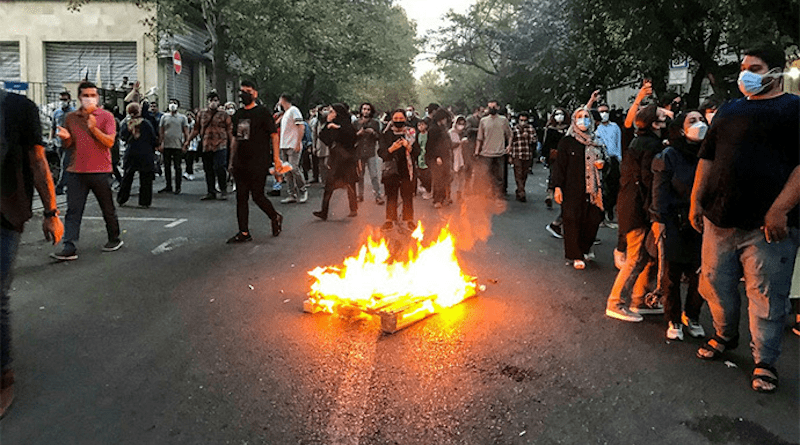Iran Regime Has Increased Its Persecution Of Minorities – OpEd
By Arab News
By Dr. Majid Rafizadeh *
The Iranian regime’s suppression, specifically of religious and ethnic minorities, has reached a new peak. Some of the most violent attacks on protesters over the last three months have been occurring in provinces where minorities, including Kurds, Arabs, Sunnis and Balochis, reside.
Three major institutions appear to be involved: The Islamic Revolutionary Guard Corps, its paramilitary group the Basij and the regime’s security forces. The deputy Middle East director at Human Rights Watch, Adam Coogle, warned that attacks by IRGC forces “on residential areas in the Kurdistan region of Iraq (are) part of a long history of lethal attacks on civilians, including during the war in Syria. Countries seeking to hold Iran accountable for its brutal crackdown … should also ensure that those responsible for indiscriminately killing civilians abroad are held accountable as well.”
It is worth noting that Mahsa Amini, whose death while in the custody of Iran’s so-called morality police sparked the ongoing nationwide protests, was from the Kurdish ethnic minority group and the Sunni religious minority group. While many Iranians are subjected to persecution for exercising their basic rights, such as freedom of expression, the persecution of ethnic minorities appears to be proportionally much greater.
As Joe Stork, deputy director of Human Rights Watch’s Middle East and North Africa Division, previously pointed out: “Iranian authorities show little tolerance of political dissent anywhere in the country, but they are particularly hostile to dissent in minority areas where there has been any history of separatist activities.”
Iran has several ethnic minority groups, which mainly live in provinces bordering other countries. The ethnic minorities include the Arabs, who live near the Iraqi border in southwest Iran; Kurds, who reside in the northwest in what is known as Iranian Kurdistan; the Azeris, who are from several provinces including Tehran, Hamadan and East Azerbaijan; and the Balochis, who mostly reside in the southeastern province of Sistan and Balochistan, which borders Pakistan.
This also suggests that there is greater discrimination against people living in the border provinces. Many members of the ethnic minority groups also happen to belong to Iran’s religious minority, the Sunnis. Sunnis are the largest religious minority in the country, with many belonging to the Arab, Balochi, Turkmen and Kurdish ethnic groups.
According to the UN’s special rapporteur for human rights in Iran, the country’s Sunnis have long raised serious concerns that the “authorities do not appoint or employ them in high-ranking government positions, such as Cabinet-level ministers or governors. They have also raised concerns regarding reported restrictions on the construction of Sunni mosques in Shiite-majority areas, including the capital Tehran, and the execution or imminent execution of Sunni activists the government alleges were involved in terrorist-related activities.”
Since its establishment in 1979, the Islamic Republic has generally viewed the country’s ethnic and religious minorities through the lens of suspicion and regarded them as an opposition group or as outsiders. In addition, since one of the major revolutionary and religious principles of Iran’s ruling clerics is to export Shiite ideology, non-Shiite groups are generally considered rivals, conspirators or threats to achieving the regime’s ideological goals.
This explains why, even though Sunnis make up about 10 percent of Iran’s population, no Sunni has been appointed to a high-level government position since the establishment of the regime in 1979. This has all been happening despite Article 12 of the Islamic Republic’s constitution stipulating: “Other Islamic schools, including the Hanafi, Shafi’i, Maliki, Hanbali and Zaydi, are to be accorded full respect and their followers are free to act in accordance with their own jurisprudence in performing their religious rites. These schools enjoy official status in matters pertaining to religious education, affairs of personal status (marriage, divorce, inheritance and wills) and related litigation in courts of law.”
It should also be noted that Iran’s ethnic and religious minorities generally live in provinces that have an abundance of natural resources. For example, Khuzestan is one of Iran’s wealthiest provinces when it comes to oil and natural gas. It reportedly produces 85 percent to 90 percent of Iran’s oil, making it the main pillar of the country’s economy and the government’s revenues. But in spite of the fact that Khuzestan is rich in natural resources, many of its Arab and Sunni population live in poverty. Balochis face the same dire situation, as they are treated like second-class citizens, repressed and sidelined.
In a nutshell, the Iranian regime has recently escalated its brutal crackdown on and suppression of ethnic and religious minorities. The country’s minorities, including the Kurds, Arabs, Balochis and Sunnis, should be free to exercise their constitutional rights. It is important that human rights groups and the international political community pressure the Iranian regime into halting its persecution and harassment of religious and ethnic minorities.
• Dr. Majid Rafizadeh is a Harvard-educated Iranian-American political scientist. Twitter: @Dr_Rafizadeh


The Mad Mullah government is clearly not interested in what their people want and regularly prove this by refusing to reform and attempting to enforce their will by violent repression, torture and murder. Sounds like it is time for this to become a real revolution. What is there to lose when the regime is killing you for no reason?
If the regime shoots at you then shoot back. If the revolutionary courts pass death sentences then kill the judges. If the Mullahs refuse to reform then kill the Mullahs! If the supreme leader refuses to listen then kill him.
WOMEN, LIFE, FREEDOM